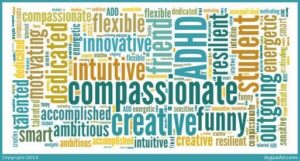When parents decide that they need to seek help for their child who has ADHD or executive function challenges, they have a lot of decisions to make. Where do parents get help? Who do they ask? What help does their child need? The choices are varied, so the process can add even more stress to an already difficult situation.
ADHD is a chronic neurodevelopmental disorder. Individuals with ADHD have an ongoing pattern of inattention and/or hyperactivity-impulsivity that interferes with daily life. ADHD may also result in difficulties with executive functions – the mental processes used for planning and execution. There are three types of ADHD: inattentive (often referred to as ADD), hyperactive-impulsive, and combined inattentive & hyperactive-impulsive. ADHD has a number of symptoms and varying levels of intensity. This means that each person’s ADHD is different, and therefore, there is no single method of treatment that works for everyone.
Students with ADHD often have trouble with attention, time management, selectiveness, procrastination, and self-regulation. In order to be diagnosed with ADHD, a number of symptoms must be present in more than one setting. For example, the child must be having issues in school AND at home. Examples of ADHD symptoms that may occur at home are procrastination, inability to initiate actions (like brushing teeth, getting ready for bed, getting started on homework), and emotional reactivity.
Where Do Parents Seek Help For Their Child With ADHD?
Parents usually seek help because their child is having difficulty in school, or they may notice that their child is unusually hyperactive. Parents will often turn to their child’s school. Schools are equipped to make assessments and provide remedial assistance. The school can provide accommodations designed to meet the child’s needs for an education. This help is often provided through either a 504 plan or an Individualized Education Plan (IEP).
Another option is to seek out a private diagnosis. The child’s pediatrician can guide the parents through the options available for diagnosis. These options are varied, but often include a trained psychologist completing a neuropsychological evaluation that includes a set of cognitive and behavioral assessments. After receiving an ADHD diagnosis, a treatment option can be determined. This can include any combination of behavioral intervention, school supports and/or medication that is prescribed by a psychiatrist or a pediatrician.
School support and medication can be effective methods of treatment, but they are not always sufficient. Additionally, parents may be reluctant to put their child on medication, so they might look for alternative ways to support their child. Behavioral intervention is an option that can stand alone or be provided with other supports.
Is ADHD or executive function coaching right for your child?
An ADHD or executive Function coach is someone who is knowledgeable about ADHD or executive function deficits and who is skilled in the area of coaching across settings. An ADHD or executive function coach assists the individual in areas where they are struggling, such as school, home, and anywhere else where symptoms may arise.
ADHD or executive function coaches work with individuals to break down tasks so that they are achievable. By using a strengths-based approach, a coach encourages students to set and meet goals, create structure, and identify their strengths in order to achieve success. It is important to note that ADHD or executive function coaching is not therapy or tutoring. ADHD or executive function coaching is a method for establishing routines and habits that contribute to managing the symptoms of ADHD or executive function challenges
Does ADHD or executive function coaching really work?
A number of studies have shown that ADHD or executive function coaching is a successful intervention for individuals with ADHD. In a study done on ADHD coaching for college students, clients who received an 8-week coaching program showed significant improvement in study skills, learning strategies, self-esteem, and satisfaction with school and work. While this study addressed college students, ADHD or executive Function coaches work with younger children as well. In some instances, particularly with students who are in grades K-5, coaches might work with the parent instead.
What strategies do students work on with an ADHD or executive function coach?
ADHD or executive function coaching is designed to provide a student with workable strategies in areas where they may struggle the most. These include:
- Getting started on homework
- Staying organized (turning homework in on time, losing things)
- Time management (waking on time for school, studying for an exam, showing up for class)
- Managing money
- Seeking assistance from teachers and professors
- Completing chores at home
When I coach students or their parents, I collaborate with them in order to create a relationship that is client-centered and holistic. I work with the client to identify realistic and achievable goals. We then break them down into doable tasks. I provide the encouragement and support needed to achieve your goals.
If you would like to hear more about the value of ADHD or executive function coaching and how you or your student can benefit, please contact me.





